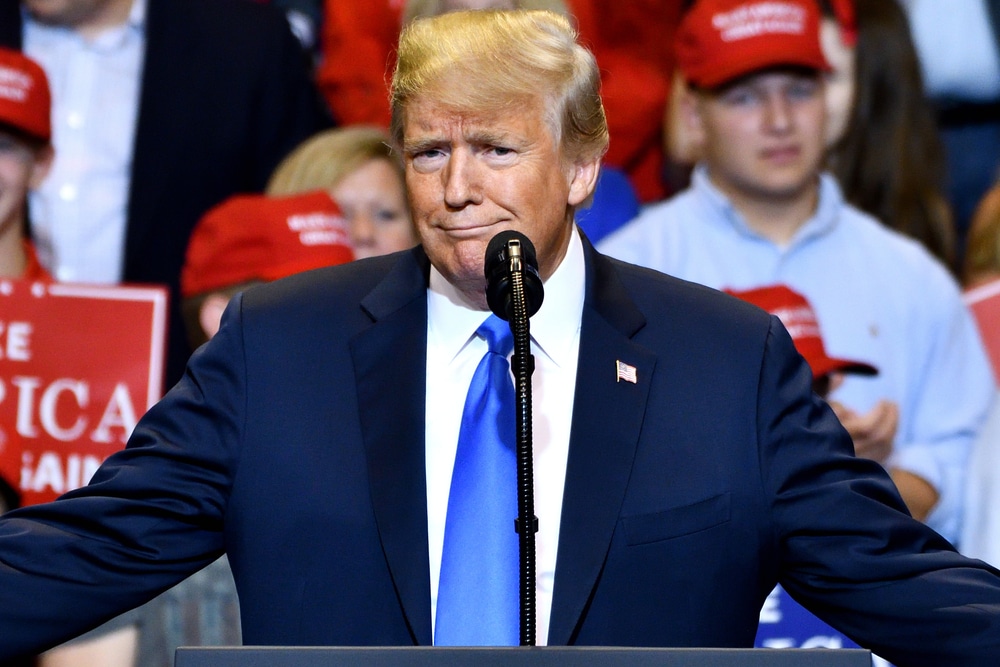Former President Trump is all but certainly going to be the GOP’s presidential nominee. Though the elections are months away, voters must know what each candidate stands for and how they could affect their finances, especially if they are retired or about to be.
The expectations

A November 2023 Nationwide Retirement Institute survey found that 45% of investors will significantly impact their retirement plans and portfolios. Despite the growing concerns among retirees and those thinking about retiring, Eric Henderson, president of Nationwide Annuity, said that voters “tend to overestimate the impact of elections,” adding that “presidents don’t have a significant impact for the long term on equity markets.”
Trump’s first term came with optimism

Until the pandemic, Americans expressed confidence in their retirement, even those without retirement plans. However, things changed dramatically, but the former president did not specifically address the possibility of the Social Security reserves drying up in 2035.
Trump vowed not to make Social Security benefit cuts

Despite promising not to make Social Security benefit cuts without any plans, it is unclear how he would create a sustainable platform to continue supporting the program. A group of GOP lawmakers have already proposed changes, including raising the retirement age and cutting Medicare. However, unlike other GOP nominees, Trump did not confirm he supported these proposals.
Trump’s SECURE Act

During the Trump administration, one bipartisan, the Setting Every Community Up for Retirement (SECURE) Act, offered to make it easier to save for retirement. This legislation improves access to tax-advantaged retirement accounts and prevents seniors from outliving their assets.
Changes in tax laws

During his first term, Trump made significant changes to tax laws. Similar changes are expected if he is re-elected. David Brillantf from Brillant Law Firm explained how the Tax Cuts and Jobs Act (TCJA) impacted retirees. For retirees with a lower tax bill on their taxable retirement earnings, TCJA lowered individual income tax rates. Yet, “for retirees with significant investment income, the changes in tax rates and deductions under the TCJA required a reevaluation of their tax planning strategies to optimize their after-tax income.”
Trump is against ESG Funds

Environmental, social, and governance (ESG) investing was restricted during Trump’s first term. This affected $12 trillion worth of capital and 150 million investors, GOBankingRates reported. If re-elected, Trump promised, “We MUST protect Americans from Radical Leftist ESG investments — I did it once, and it’s time to do it again as I set the example for Republicans across the country to follow my lead in fighting ESG.”
The solution could be the Credit for Caring Act

A Republican lawmaker, Joni Ernst, proposed the Credit for Caring Act. It would provide up to $3,000 in nonrefundable tax credits to those providing long-term care to loved ones, and it saw support from some Democrats. Similar proposals came from the Biden team.
“Sidecar” accounts and universal savings accounts

Sidecar accounts have bipartisan support, and the interest peaked during Trump’s first term, but it never materialized due to the pandemic. Rachel Greszlera of the Heritage Foundation told Forbes, “It’s a way to save in an account with whatever purpose is best for you.”
Preparing for Trump’s possible second term

Alana Gibson, chief operating officer at DGR Legal, told GOBankingRates that regardless of who takes over the office, “Diversification of income sources, careful tax planning and staying abreast of policy developments are prudent strategies” are a must.
Consult a pro

According to CNBC, financial advisors agreed that “top strategies include buying annuities, diversifying and focusing on non-correlated assets, and using more liquid investments like mutual funds and ETFs.” If you have a plan, stick to it, but you will need an advisor if you don’t.
Despite the predictions, it would be best to wait to claim your Social Security

Recent research finds that “all U.S. workers age 45 to 62 would benefit from waiting until beyond age 65 to start receiving benefits,” CNBC reported. The study confirmed that people would greatly benefit if they waited until they turned 70. Only 10% are that patient.
Educate yourself

Even if you have little or no interest in daily politics, check out the official plans for the yet-to-be-announced candidates. Still, most of the financial questions depend on a number of factors, including your openness and possibilities to invest, regardless of who’s sitting in the White House.
Read Next: What Really Causes Donald Trump’s Skin to be So Orange

Former President Donald Trump’s distinctive orange skin has captivated attention, sparking curiosity about its evolution from average pale over the years:
What Really Causes Donald Trump’s Skin to be So Orange
21 of the Biggest Lies in American History

Dive into the shadows of American history as we explore 21 of its biggest lies that have left an indelible mark on the nation’s narrative:
21 of the Biggest Lies in American History
32 Things We Once Highly Respected but Are a Complete Joke Now

Discover the amusing downfall of once-respected entities in our changing world:
32 Things We Once Highly Respected but Are a Complete Joke Now
23 of Donald Trump’s Most Hilarious Moments as President

Explore the lighter side of Donald Trump’s presidency with 23 hilariously memorable moments that left the nation in stitches:
23 of Donald Trump’s Most Hilarious Moments as President
27 Things MAGA Movement Ruined Forever for People

How the MAGA movement left its mark on individuals and disrupted certain aspects of our everyday life forever:










